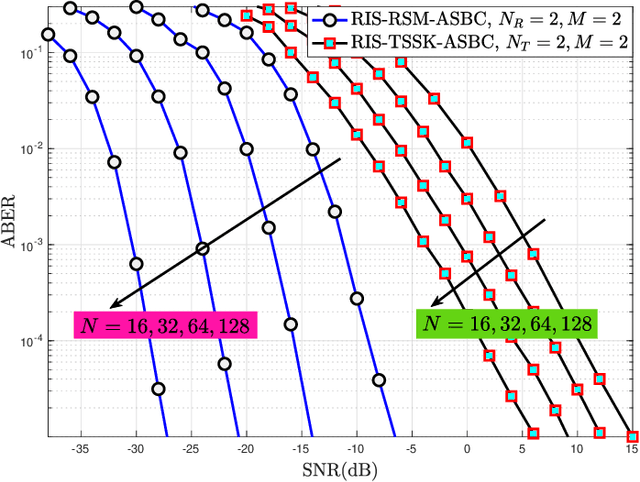Ferhat Bayar
Deep Learning Based Detection on RIS Assisted RSM and RSSK Techniques
Oct 18, 2023Abstract:The reconfigurable intelligent surface (RIS) is considered a crucial technology for the future of wireless communication. Recently, there has been significant interest in combining RIS with spatial modulation (SM) or space shift keying (SSK) to achieve a balance between spectral and energy efficiency. In this paper, we have investigated the use of deep learning techniques for detection in RIS-aided received SM (RSM)/received-SSK (RSSK) systems over Weibull fading channels, specifically by extending the RIS-aided SM/SSK system to a specific case of the conventional SM system. By employing the concept of neural networks, the study focuses on model-driven deep learning detection namely block deep neural networks (B-DNN) for RIS-aided SM systems and compares its performance against maximum likelihood (ML) and greedy detectors. Finally, it has been demonstrated by Monte Carlo simulation that while B-DNN achieved a bit error rate (BER) performance close to that of ML, it gave better results than the Greedy detector.
Space-Time Block Coded Reconfigurable Intelligent Surface-Based Received Spatial Modulation
Mar 28, 2022



Abstract:Reconfigurable intelligent surface (RIS) structures reflect the incident signals by adjusting phase adaptively according to the channel condition where doing transmission in order to increase signal quality at the receiver. Besides, the spatial modulation (SM) technique is a possible candidate for future energy-efficient wireless communications due to providing better throughput, low-cost implementation and good error performance. Also, Alamouti's space-time block coding (ASBC) is an important space and time coding technique in terms of diversity gain and simplified ML detection. In this paper, we proposed the RIS assisted received spatial modulation (RSM) scheme with ASBC, namely RIS-RSM-ASBC. The termed RIS is portioned by two parts in the proposed system model. Each one is utilized as an access point (AP) to transmit its Alamouti coded information while reflecting passive signals to the selected received antenna. The optimal maximum likelihood (ML) detector is designed for the proposed RIS-RSM-ASBC scheme. Extensive computer simulations are conducted to corroborate theoretical derivations. Results show that RIS-RSM-ASBC system is highly reliable and provides data rate enhancement in contrast to conventional RIS assisted transmit SM (RIS-TSM), RIS assisted transmit quadrature SM (RIS-TQSM), RIS assisted received SM (RIS-RSM), RIS assisted transmit space shift keying with ASBC (RIS-TSSK-ASBC) and RIS-TSSK-VBLAST schemes.
 Add to Chrome
Add to Chrome Add to Firefox
Add to Firefox Add to Edge
Add to Edge